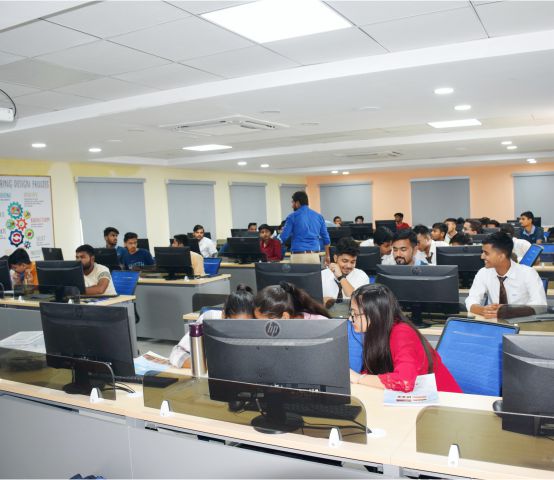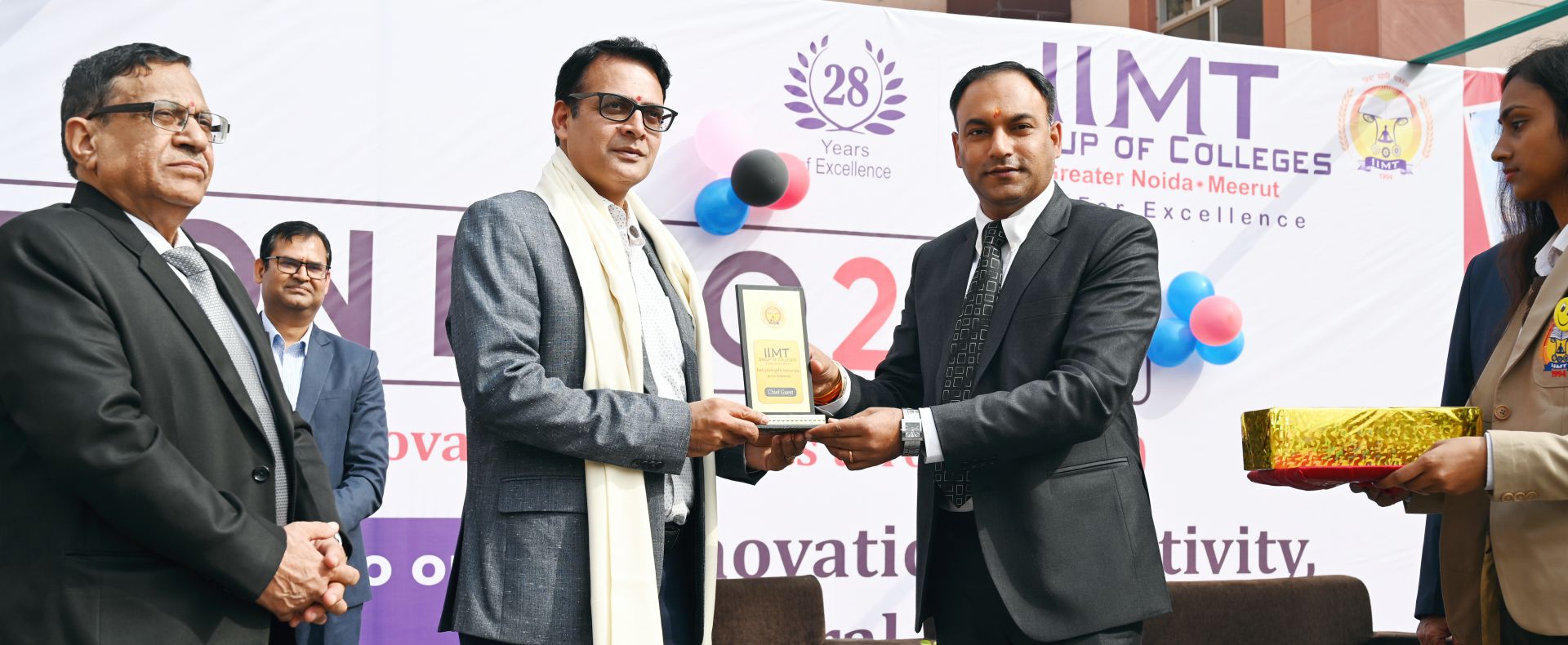IIMT Innovation & Start-up Policy
To encourage students to start their enterprises and ensure such Entrepreneurs imbibed with leadership qualities using innovative and ethical business practices to make a global impact.
1. IIMT Innovation and Start-up Policy, aims to enable its students to get first-hand experience in entrepreneurship, promote innovation-driven activities at the institute and provide comprehensive and integrated range of support, including space, mentoring, training programs, networking and an array of other benefits.
2. IIMT Innovation and Start-up Policy, nurtured to be the hub of innovative and
high-impact ventures in social, educational, commercial, and other domains.
Our Mission
1. The IIMT Innovation and Start-up Policy aims to enable its students to get first-hand experience in entrepreneurship, promote innovation-driven activities at the institute, and provide a comprehensive and integrated range of support, including space, mentoring, training programs, networking, and an array of other benefits.
2. IIMT Innovation and Start-up Policy, nurtured to be the hub of innovative and high-impact ventures in social, educational, commercial, and other domains.
Our Vision
To encourage students to start their enterprises and ensure such entrepreneurs are imbued with leadership qualities using innovative and ethical business practices to make a global impact.

THE INCUBATION CENTRE
- The Incubation Centre nurtures technology ventures through their start-up phase by providing all the support necessary to help entrepreneurs establish themselves before they scale up their ventures.
- IIMT Incubation Centre (IIMT-IC) seeks to support entrepreneurs in translating innovations into products and services that are commercially viable.
- Through the Incubation Center, students gain hands-on experience in innovation and entrepreneurship while being nurtured and encouraged by faculty, management, and industry experts.
- The scope of support is envisaged to be broad-based and covers technologies/IP developed wholly at the institute or partly through collaborations elsewhere.
- The IIMT-IC will also be open to considering proposals with strong social and strategic impact.
OPERATING MODEL
- The IIMT Incubation Center at an operational level is responsible for nurturing innovative ideas by handholding the students through the business proposal stage, identifying the target market, creating a minimum viable product or service, technological guidance, industry exposure, pre-launch activities, consumer feedback, and exposure to the investor community.
- Students may be offered shared office space at IIMT-IC on a case-by-case basis. IIMT-IC will also actively support students with a combination of inputs, including:
- a) Branding: Students may apply for permission to brand themselves as “IIMT Incubated Company.”
- b) Get support on obtaining recognition under the STARTUP INDIA program, DIPP, and GoI.
- c) Business support services: in-house consultants offering accounting, tax, company secretary, legal, and IP services
- d) Mentoring: Alumni mentors (by IIMT Entrepreneurship Forum): monthly clinics. Entrepreneur-in-Residence: interact with entrepreneurs and industrialists.
- e) Permission to use laboratories, workshop facilities, and equipment at IIMT.
- f) Seed Funding: IIMT Startup Fund and Government Seed Support (MSME grant, DST-TDB/DeiTY seed funds).
- g) Networking: Engage actively with each other to leverage collective knowledge and networks.
- h) Introduction to Angel investors/VCs/financial institutions; IIMT visitors (industry, alumni).
- i) Supporting innovation and pre-incubation activities on the IIMT campus.
- j) Training—leveraging resources of the IIMT alumni network.
INCUBATION CENTRE SELECTION PROCESS:
- 1. Submit an application in the prescribed format to IIMT-IC through the concerned department.
- 2. Screening by IIMT Innovation and Start-up Committee (Proposals are examined with attention to financial, technical, and social impact parameters)
- 3. Final approval by the committee
- 4. Agreement executed to formally commence incubation at IIMT Innovation and Start-up.
ELIGIBILITY
- The IIMT Incubation Centre seeks to support all members to translate innovation into products, processes, and services that are commercially viable. Admission to the Incubation center is open to:
- 1. Students (Current and Alumni <2 years)
- 2. Faculty and Staff (Current) including Adjunct faculty
SCHOLARSHIPS
- The IIMT Scholarships are awarded to students with financial need, as determined by the IIMT Innovation and Start-up Committee. It is a merit cum means scholarship. Any student who is economically weak, and/or from a rural area is eligible to apply. The applicant must furnish the relevant details as proof of his/her eligibility. A good academic record is a must.
- The following document(s) are required.
- A community/income certificate from an official, not below the rank of a revenue inspector.
- Statement of Marks.
- Incomplete applications will not be accepted.
ACTIVITIES UNDER IIMT INNOVATION AND START-UP POLICY
- 1. Entrepreneurship Summit. The annual three-day entrepreneurial fest constitutes several competitions, workshops, and talks aimed at inculcating the feeling of entrepreneurship amongst students. This three-day festival encompassed exhilarating events like inspiring talks by eminent personalities, enriching workshops, and thought-provoking competitions.
- 2. Annual talks series of eminent speakers from the fields of Technology, Management, Entertainment, and Design to expose the IIMT family to enthusiastic ideas from distinguished personalities.
- 3. Startup Internship Program - Start-up Internship Program (SIP) strives to develop an entrepreneurial streak among students by helping them acquire an internship in the most spirited and exciting startups of our country.
- 4. Campus Entrepreneurs - Campus Entrepreneurs are a group of students on the campus who have either extensively worked with start-ups or have started one. Startup Cell with their support organizes ‘entrepreneurial hangouts ‘. These hangouts are group discussions aimed at discussing the opportunities and challenges in a sector or journey of a start-up. Campus.
- 5. Empowering Startup Scheme to Encourage and Nurture Campus Entrepreneurs – A program to encourage budding campus entrepreneurs. We call in ideas from students and encourage them to take it up as a summer project wherein we provide mentorship and guidance to help them en route to turning their idea into a billion-dollar start-up.
- 6. Campus Ambassadors – A student selected as a campus ambassador from every department based on his/her aptitude for business and entrepreneurship. The selected campus ambassador, in his/her entire tenure, will represent in their department and will be equipped with tools that would be aimed to bring about his personal development as well as the advancement of the entrepreneurial ecosystem in his/her college.
- 7. Deferred Placement Program: Deferred placements enable students to defer placements by a year to start their ventures. Under this program, if the student does not wish to take up a campus placement offer, he/she can pursue with their startup, and if, after one year, they wish again to take up a job, may attend the campus-interviews in the year after that of their passing out.
- 8. Student Entrepreneurship Policy: This policy aims at establishing rules, and procedures to regulate student-promoted start-ups. IIMT will permit the students to start their venture while still on campus, however in a regulated manner so that their degree is not affected. This initiative shall offer new possibilities for students to collaborate and form teams early on and is likely to help the institute commercialize the technical know-how generated by faculty and students.
- 9. Startup Fair is a platform that involves the interaction of Entrepreneurs and students and aims to help Start recruit the finest talent for internships/jobs. Besides, due to the presence of a large number of Venture Capitalists, it is also an opportunity for the Startups to showcase their growth to the VCs and apply for their funding.
FINANCIAL STRATEGY
- a) Minimum 2% fund of the total annual budget of the IIMT shall be allocated for funding and supporting innovation and startup-related activities through the creation of a separate ‘Innovation fund’.
- b)IIMT Innovation and Start-up shall try to bring in external funding through government (state and central) such as DST, DBT, MHRD, AICTE, TDB, TIFAC, DSIR, CSIR, BIRAC, NSTEDB, NRDC, Startup India, Invest India, MeitY, MSDE, MSME, etc. and non-government sources should be encouraged.
PRODUCT OWNERSHIP RIGHTS FOR TECHNOLOGIES DEVELOPED AT INSTITUTE
- a)When IIMT facilities/funds are used substantially or when IPR is developed as a part of curriculum/ academic activity, IPR is to be jointly owned by inventors and the IIMT.
- b) Inventors and IIMT could together license the product / IPR to any commercial organization, with inventors having the primary say. License fees could be either/or a mix of
- Upfront fees or one-time technology transfer fees
- Royalty as a percentage of sale prices
- Shares in the company licensing the product
- c)On the other hand, if the product/ IPR is developed by innovators not using any institute facilities, outside office hours (for staff and faculty), or not as a part of the curriculum by the student, then the product/ IPR will be entirely owned by inventors in proportion to the contributions made by them. In this case, inventors can decide to license the technology to third parties or use the technology the way they deem fit.
- d) The IIMT incubation center will only be a coordinator and facilitator for providing services to faculty, staff, and students. They will have no say on how the invention is carried out, how it is patented, or how it is to be licensed. If IIMT is to pay for patent filing, they can have a committee that can examine whether the IPR is worth patenting. If inventors are using their funds or non-institute funds, then they alone should have a say in patenting.
2.ORGANIZATIONAL CAPACITY, HUMAN RESOURCES AND INCENTIVES
- i) To attract and retain the right people, IIMT shall develop academic and non-academic incentives and reward mechanisms for all staff and stakeholders that actively contribute and support entrepreneurship agenda and activities.
- ii) The reward system for the staff may include sabbaticals, office and lab space for entrepreneurial activities, reduced teaching loads, awards, training, etc.
- iii) A performance matrix should be developed and used for the evaluation of annual performance.
3.PEDAGOGY AND LEARNING INTERVENTIONS FOR ENTREPRENEURSHIP DEVELOPMENT
- i) IIMT shall start the annual ‘INNOVATION & ENTREPRENEURSHIP AWARD’ to recognize outstanding ideas, successful enterprises, and contributors for promoting innovation and enterprise ecosystem within the institute.
- ii) Innovation champions shall be nominated from within the students/ faculty/ staff for each department/ stream of study.
4.ENTREPRENEURIAL IMPACT ASSESSMENT
- a) Impact assessment of IIMT’s entrepreneurial initiatives such as pre-incubation, incubation, and entrepreneurship education shall be performed regularly using well-defined evaluation parameters.
- b) Monitoring and evaluation of knowledge exchange initiatives, and engagement of all departments and faculty in entrepreneurial teaching and learning shall be assessed.
- c) The number of startups created, the support system provided at the college level and satisfaction of participants, new business relationships created by the college shall be recorded and used for impact assessment.
- d) Impact shall also be measured for the support system provided by the college to the student entrepreneurs, faculty, and staff for pre-incubation, incubation, IPR protection, industry linkages, exposure to the entrepreneurial ecosystem, etc.
- e) Impact assessment for measuring the success shall be in terms of sustainable social, financial, and technological impact in the market. For innovations at the pre-commercial stage, the development of a sustainable enterprise model is critical. COMMERCIAL success is the ONLY measure in the long run.
- b) Monitoring and evaluation of knowledge exchange initiatives, and engagement of all departments and faculty in entrepreneurial teaching and learning shall be assessed.
